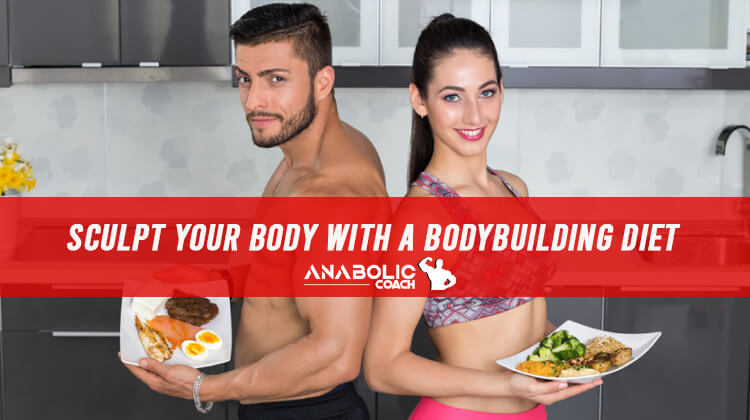Your diet is just as important as your workout program in bodybuilding. As a matter of fact, without a proper diet, you would struggle to effectively execute your exercises and training with any meaningful degree of success.
The food you eat before, during, and after your workout sessions will not only nourish your body, but also provide you with your daily energy requirements.
In addition to this, your nutrition will promote muscle growth, repair, and recovery. So it gies without saying that if you are a newbie to the exciting world of bodybuilding, then you would need a beginners bodybuilding diet that is ideally suited to your peculiar bodybuilding needs and goals.
But before you start off a beginners bodybuilding diet, there are a few things you need to know, such as; how to create a diet plan for bodybuilding, and the foods to choose for bodybuilding diet. This article briefly explains all these, and more.
How to Create a Beginners Bodybuilding Diet?
The first thing you need to know before you create a beginners bodybuilding diet is that no two dietary plans can be exactly the same.
So while you may be an avid follower of a bodybuilder and mentor, and you want to implement their own dietary plan, you need to first take a step back and ask yourself if that diet is right for you, and your bodybuilding needs and goals.
However, there are fundamental things that you need to note when attempting to create a bodybuilding diet and these basics include:
#1. Your Bodybuilding Goals:
You need to be clear on what exactly you want to achieve from your bodybuilding efforts. Typically, bodybuilders engage in bodybuilding for four classic reasons, namely; to build muscle mass, lose weight, shed body fat, and to improve athletic performance.
Your bodybuilding goal(s) may incorporate one or more of these classic reasons, and your diet should be designed to match the energy demands of such goal(s) accordingly.
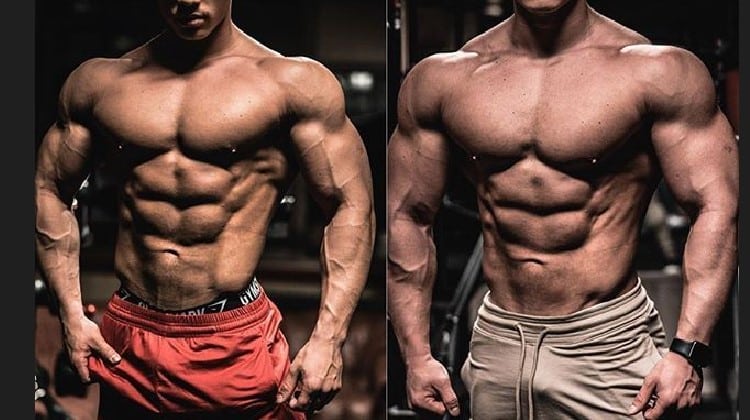
#2. Your Age and Other Demographics:
Another important consideration when creating a bodybuilding diet is your age. As you grow older, you tend to lose body fat and muscle bulk, so while it is vital to consider your bodybuilding goals while designing a dietary plan, you also have to put into consideration the undeniable physiological facts that come with aging.
Other demographics also come into play when creating your dietary plan and that also includes your gender.
#3. Your Body Mass Index (BMI):
Your BMI is also a crucial influencer in determining the direction your bodybuilding diet plan will take.
For example, the average BMI for an adult is within the range of 18.5 to 24.9, so if your BMI is above this, you may be overweight.
In this instant, your bodybuilding diet may be customized to help you lose weight and/or shed body fat for a lean, sculpted physique rather than gaining weight and/or bulking which could further cause you to have a higher than normal BMI.
Similarly, if your BMI is less than the average range of 18.5 to 24.9, then you are grossly underweight and so your bodybuilding diet would naturally be tuned towards bulking and weight gain.
#4. Availability:
Depending on where you may reside around the world, certain foods may not be readily available to you. So while you are eager to imitqte the dietary plan of someone, your desires may soon be cutshort if you find it hard to find similar foods in your country.
What is more important when creating a beginners bodybuilding diet plan is not so much in matching the types of foods contained in the diet of your mentor, but in actually meeting the energy requirements through the foods you eat.
In other words, you may not consume similar foods as someone, but the foods you do consume are more than capable of providing you with the energy, and nutrition needed to help you in achieving your bodybuilding goals.
#5. Special Considerations:
In preparing a dietary plan you also have to make provision for what we call special considerations. This is where your diet will be based on your special nutrition needs. Here you need to know what foods you are allergic to and what foods your body can tolerate or not.
This is why copying the bodybuilding diet of another bodybuilder can be tricky, as more often than not, the bodybuilder would have customized their diet to meet their peculiar health concerns and special dietary needs.
Which Foods to Choose for a Diet Plan for Bodybuilding?
Your beginners bodybuilding diet should include a broad group of foods that will provide you with the nourishment to promote growth, repair, and recovery as well as the energy requirement to help you excel in your scheduled training sessions.
The six (6) main food groups to include in your diet plan for bodybuilding will provide you with the three macros (carbohydrates, fats, and proteins) as well as vitamins, and essential minerals.
These six (6) groups include:
#1. Proteins:
Protein is needed to help you build muscle mass as protein is synthesized in your skeletal muscle tissues to promote muscle growth.
You can get protein from food sources, such as; red and white meat including pork tenderloin, ground beef, venison, sirloin steak, chicken breast, turkey, cod, tilapia, and salmon.
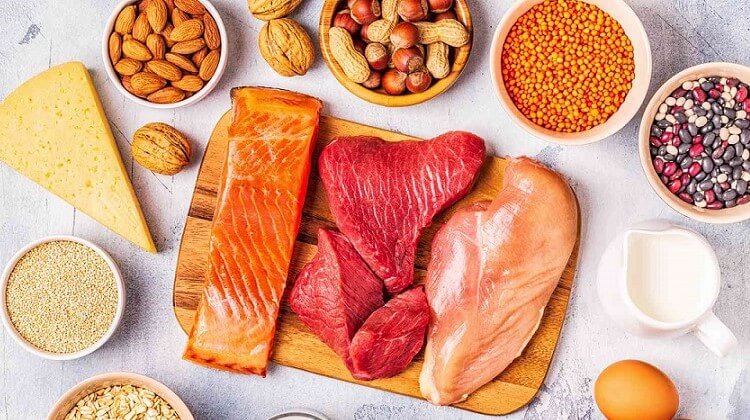
#2. Dairy:
Calcium is essential for strong muscles and bones which is vital, especially if you intend running a weight training program, and lifting heavy.
To meet your daily calcium needs, you can include dairy products in your dietary plan.
You can get calcium as well as other essential minerals and vitamins from cottage cheese, low-fat cheese, low-fat milk, and yogurt.
#3. Whole Grains:
Whole grains will provide you with carbohydrates and the energy fuel needed for high-interval intensity training (HIIT).
You can include whole grains like brown rice, cereals, wheat bread, quinoa, oats, popcorn, and crackers to your diet.
#4. Fruits and Vegetables:
You will get lots of fiber, vitamins, and minerals from eating veggies and fruits. Vegetables and fruits will keep you healthy, aid repair, and recovery from muscle and/or bone-related injuries.
You should include vegetables and fruits like broccoli, corn, green beans, green peas, lettuce, potatoes, tomatoes, spinach, apples, grapes, oranges, and bananas.
#5. Nuts and Seeds:
Nuts and seeds will provide your body with healthy dietary fats, protein, fiber, minerals, and vitamins.
With nuts and seeds in your diet, you will provide your body with both energy fuel and satiety which is great if you are on a cutting diet and bodybuilding program.
You can include nuts and seeds like walnuts, almonds, flax seeds, chia, and sunflower seeds in your beginners bodybuilding diet.
#6. Beans and Legumes:
Beans and legumes are plant-based sources of protein and dietary fiber. Similar to fruits, veggies, nuts, and seeds – beans and legumes will keep you satisfied and full.
Therefore, they are a great food source if you want to run a cutting bodybuilding program. The best beans and legumes sources include black beans, chickpeas, kidney beans, and lentils.
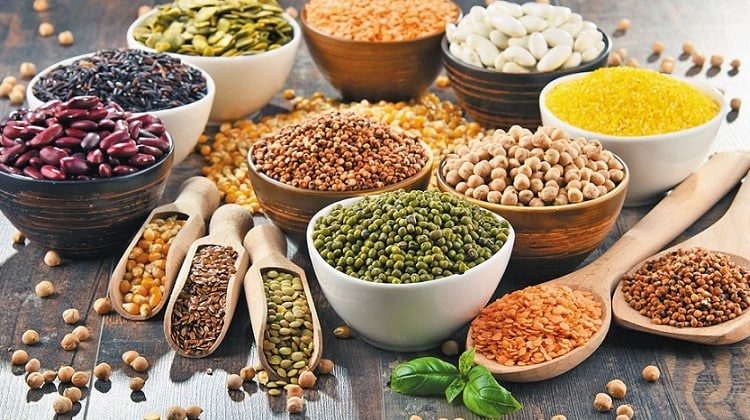
Beginner Bodybuilder Meal Plan
As a beginner bodybuilder, you can optimize the bodybuilding gains of muscle building and improved athletic performance while shedding fat in the process by running a clean dietary plan for a period of one month.
But before we get into the meal plan you can adopt, you should know that eating daily meals 3 to 4 hours apart can go a long way in helping boosting your metabolism, encouraging thermogenesis, and lipolysis.
What’s more, it will promote increased protein synthesis in your skeletal muscles which then leads to muscle mass gains.
Ideally, you should have anywhere from 5 to 6 daily meals. This way you will stay healthy and energetic throughout the day.
For your macros intake, you should maintain the following daily meal plan:
#1. Protein:
For your daily protein intake you should consume between 1 to 1.5 grams per pound bodyweight. For each of your meals, you should try consuming between 25 to 30 grams or 6 to 8 oz of protein.
You can chow on both animal and plant-based protein sources, such as; high quality organic chicken, turkey, eggs, salmon, grass-fed beef, shrimps, Greek yogurt, cottage cheese, and casein or whey protein powders.
#2. Carbohydrates:
Your daily intake of carbohydrates should be between 150 to 250 grams.
Your meal plan can include complex carbohydrates, such as; whole grain pastas, beans, brown rice, sweet poratoes, sprouted grain breads, quinoa, and oats.
The metabolism of complex carbohydrates tends to be slow therefore providing your body with a good amount of energy fuel throughout the day.
You can also include simple carbohydrates in your meal plan with the best sources of simple carbs being white rice, fruits, and white potatoes.
Simple carbs digest fast and will give you a quick burst of energy which is particularly useful in HIIT sessions. Simple carbs will also help with your post-workout recovery by promoting muscle repair and growth.
#3. Fats:
Your daily fats intake in your beginners bodybuilding diet should be anywhere from 65 to 85 grams.
You can get your daily supply of healthy dietary fats from natural sources, such as; extra virgin olive oil, coconut oil, egg yolk, natural nut butters, and avocados.
Healthy fats will provide you with a good source of energy fuel that can last for long periods of time during your training sessions.
In addition to meeting your daily needs for macros, you also need to consume a good amount of veggies which will supply you dietary fiber that aids digestion and prevents constipation.
You also need to drink a sufficient amount of water on a daily basis. The amount of water you should drink daily should be equivalent to about half your overall bodyweight. Finally, try as much as possible to avoid drinking sodas and sugary drinks.
Before and After a Bodybuilding Diet
When it comes to the results you can expect from your beginners bodybuilding diet, it is worth mentioning that you can be certain of definite positive changes in your physique, and appearance. A bodybuilding diet will keep you looking healthy and fit with lean muscle mass.
However, to achieve a sculpted body composition, you need to back-up your bodybuilding diet with a well conceived training program consisting of cardio, and weight training.
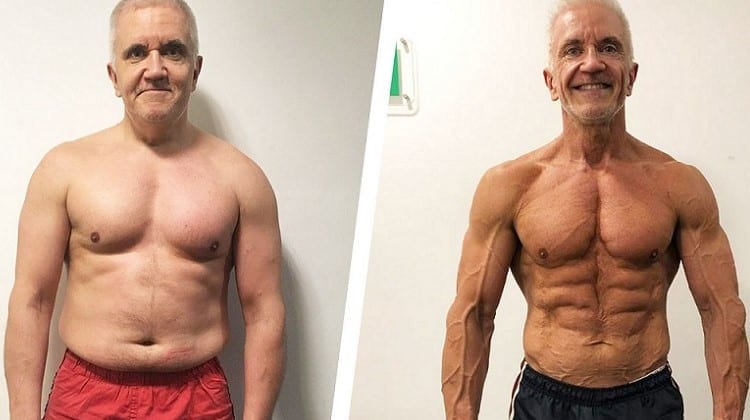
Final Thoughts
The importance of a diet plan for bodybuilding for newbies cannot be overemphasized. You need to take time out to understand the food source you need to include in your diet plan. Pay attention to your three macros of carbohydrates, proteins, and fats.
You should also try to eat clean at all times while maintaining between 5 to 6 meals per day. You can break these meals into breafast, mid-morning snack, lunch, mid-day snack, dinner, and a bedtime snack (optional).
To round up, you should consult with your physician as well as personal bodybuilding coach before starting any bodybuilding dietary plan.
If you want assistance in starting a diet plan, you can get in touch for free with an IFBB PRO here today.

